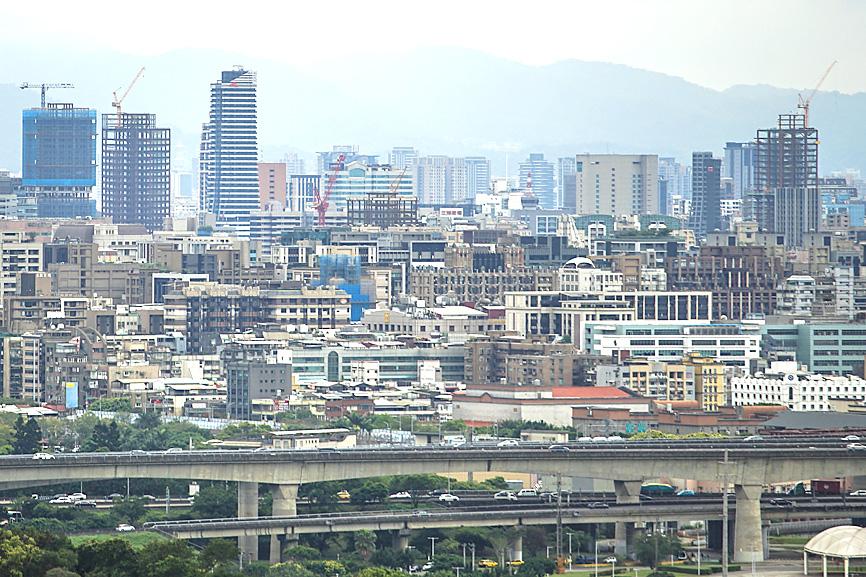The presale and new housing market in northern Taiwan shrank 14 percent in the second quarter from three months earlier to NT$228.55 billion (US$8.19 billion), as a local COVID-19 outbreak and unfavorable government policies weakened sentiment and pushed developers to the sidelines, the Chinese-language My Housing Monthly reported yesterday.
The trend suggested a steeper decline of up to 30 percent compared with the same period last year, the report said.
“Developers turned cautious and preferred to wait and see while the market assimilates to credit controls, property tax hikes and the lingering level 3 [COVID-19] alert,” My Housing Monthly research manager Ho Shih-chang (何世昌) wrote in the report.

Photo: CNA
The market could regain momentum next quarter thanks to the fall in local infections this month, Ho said.
Presale projects and newly completed houses might reach NT$550 billion and NT$600 billion respectively in the second half of this year, pushing the trading volume for the full year to surpass NT$1 trillion, Ho said, adding that he expects a number between NT$1.05 trillion and NT$1.1 trillion.
Developers are likely to introduce new projects next month or in September when Taiwan is expected to emerge from the virus outbreak, he said, adding that a solid economy and low interest rates would continue to lend support.
In the first half of the year, presale and newly finished houses in northern Taiwan totaled NT$494.64 billion, representing a 19 percent retreat from a year earlier, the report said.
Taipei posted the biggest decline nationwide, with sales dropping 37 percent to NT$109.7 billion in the first six months, Ho said, attributing the decline to the severity of the COVID-19 outbreak in the capital and the relatively strong effect of the policy measures on the city’s housing market.
However, prices held relatively firm in Taipei, thanks to tight supply, he said.
New Taipei City reported a 17.6 percent decline to NT$195 billion, while sales in Taoyuan fell 20 percent to NT$107.3 billion, the report said.
Hsinchu City bucked the trend as it posted an annual increase of 25 percent to NT$68.8 billion, it said.
Keelung and Yilan County also reported increases of 25.8 percent and 17 percent respectively, the report said.
Separately, Taichung-based Sakura Development Co (櫻花建設) on Tuesday said that it is expecting improved earnings in the second half of this year, as profits from five residential projects in Taichung would be booked.
The company finished the first six months with net losses per share of NT$0.07 due to an 88 percent annual retreat in revenue to NT$166 million.
However, the company is to wrap up construction at five residential complexes with 916 apartment units in Taichung that are expected to generate NT$8.4 billion in sales, it said.
The five projects are all sold-out, and the company would book the profits upon turning over the keys to buyers.
Sakura Development said it would refocus its strategy away from the presale market, as transfers of presale contracts within five years of purchase would be subject to property taxes of 35 to 45 percent.
It would instead focus on new projects that it would market once fully or partly completed, it said.

South Korea’s equity benchmark yesterday crossed a new milestone just a month after surpassing the once-unthinkable 5,000 mark as surging global memory demand powers the country’s biggest chipmakers. The KOSPI advanced as much as 2.6 percent to a record 6,123, with Samsung Electronics Co and SK Hynix Inc each gaining more than 2 percent. With the benchmark now up 45 percent this year, South Korea’s stock market capitalization has also moved past France’s, following last month’s overtaking of Germany’s. Long overlooked by foreign funds, despite being undervalued, South Korean stocks have now emerged as clear winners in the global market. The so-called “artificial intelligence

‘SEISMIC SHIFT’: The researcher forecast there would be about 1.1 billion mobile shipments this year, down from 1.26 billion the prior year and erasing years of gains The global smartphone market is expected to contract 12.9 percent this year due to the unprecedented memorychip shortage, marking “a crisis like no other,” researcher International Data Corp (IDC) said. The new forecast, a dramatic revision down from earlier estimates, gives the latest accounting of the ongoing memory crunch that is affecting every corner of the electronics industry. The demand for advanced memory to power artificial intelligence (AI) tasks has drained global supply until well into next year and jeopardizes the business model of many smartphone makers. IDC forecast about 1.1 billion mobile shipments this year, down from 1.26 billion the prior

People stand in a Pokemon store in Tokyo on Thursday. One of the world highest-grossing franchises is celebrated its 30th anniversary yesterday.

Chinese artificial intelligence (AI) start-up DeepSeek’s (深度求索) latest AI model, set to be released as soon as next week, was trained on Nvidia Corp’s most advanced AI chip, the Blackwell, a senior official of US President Donald Trump’s administration said on Monday, in what could represent a violation of US export controls. The US believes DeepSeek will remove the technical indicators that might reveal its use of American AI chips, the official said, adding that the Blackwells are likely clustered at its data center in Inner Mongolia, an autonomous region of China. The person declined to say how the US government received